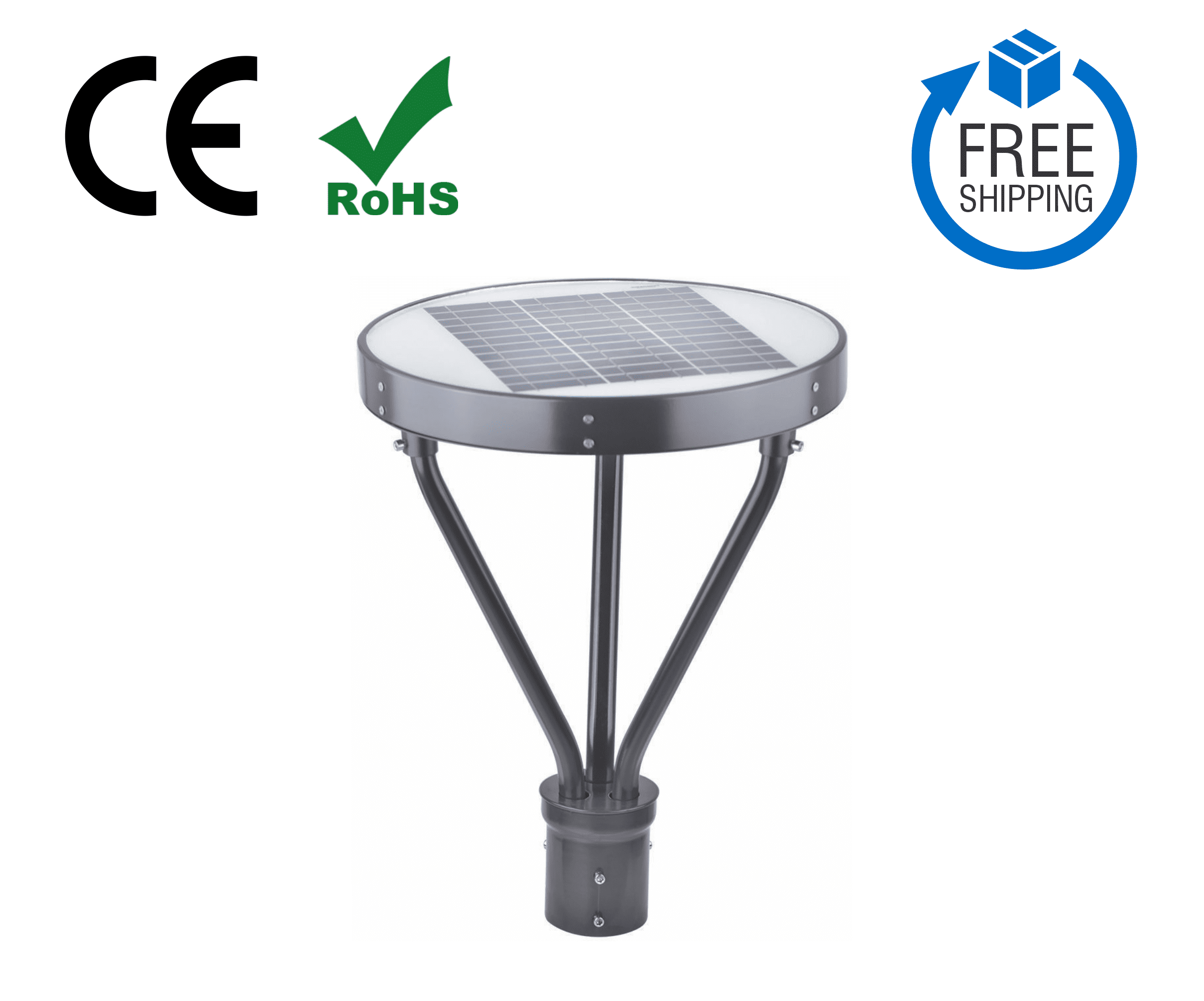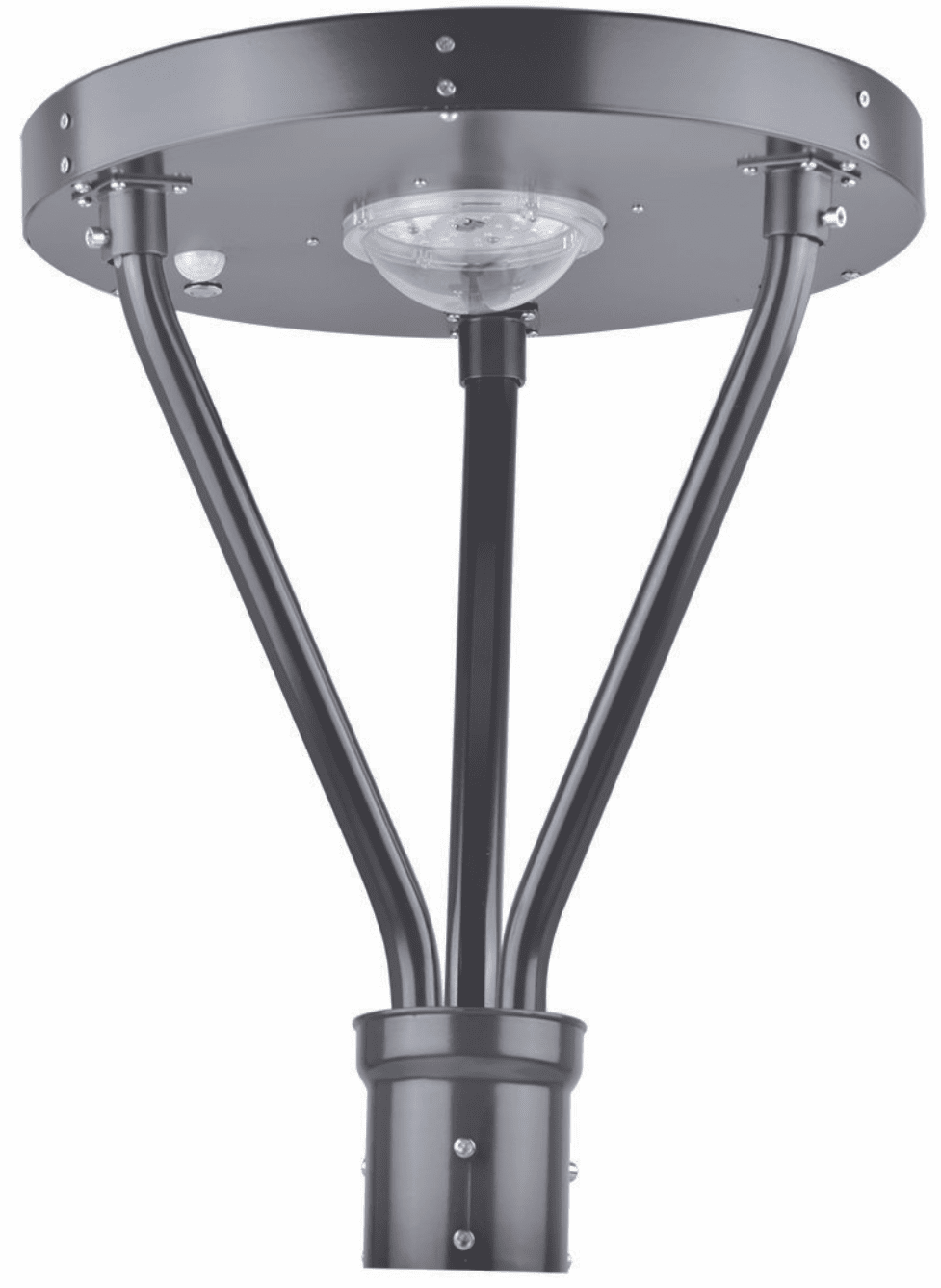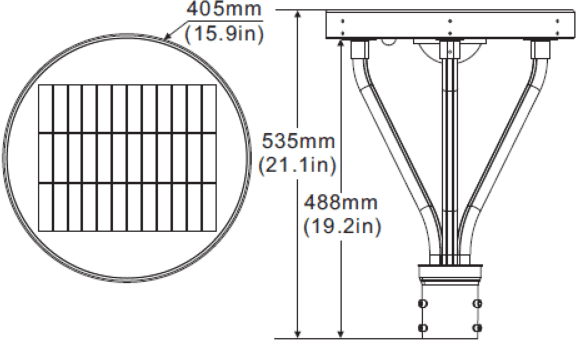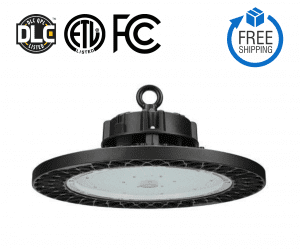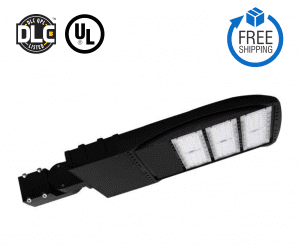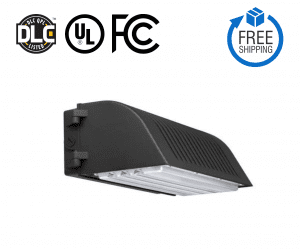Description
- Beam angle: 120 degrees.
- Aluminum die-cast heat sinks provide superior heat dissipation.
- Replaces conventional area lights.
- Green, energy saving, 50,000 hour expected lifespan.
- No RF interference, no IR/UV radiation, no mercury pollution.
- Available in a wade range of color temperatures (CCT), 2700-6700K
- Streamlined exterior design, elegant appearance.
- Environment friendly, energy saving (70~80%).
- Each LED operates independently assuring continuous performance.
Specifications
| Solar Panel Max Power | 18V/30W |
| Luminous Flux | 3000lm |
| Luminous Efficacy | 120lm/W |
| Mounting Height | 3-5m |
| Space Between Lights | 10-15m |
| Solar Panel Dimensions | 405mm diameter x 41mm |
| Sensor | Default: PIR sensor & time controller |
| Controller | PWM controller, MPPT controller optional |
| Battery | Ternary LiFePO4 Li-ion battery, Li-ion battery |
| Discharge Time | More than 10-12 hours |
| Charge Time | 6-7 hours (with sufficient sunlight) |
| Solar Cell | High efficiency silicon |
| Light Source | SMD LED |
| Operating Temperature | -40° – +45°C |
| Color Temperature (CCT) | 2700K SW / 3000K WW / 4100K NW / 5000K DW / 5700K CW |
| Lifespan | 50,000 hours |
| Weather Protection | IP65 |
| Beam Angle | 120° |
| Warranty | 3 years |
Download Product Cut Sheet
Knowledge Base
Are solar parking lot lights worth the investment?
With no carbon emissions, nothing to burn, no power to consume (other than solar power, obviously), solar parking lot lights are worth the investment because they save companies and cities several thousands of dollars while reducing our overall carbon footprint.
Which lighting is best for parking lots?
LED shoebox lights are a great lighting source for many different applications like parking lots, roads, and highways. Ensuring people’s safety is paramount and is easily attained with shoebox light fixtures.
Do solar lights work on cloudy days?
The short answer is – yes! Although direct sunlight is key to charging solar panels, they continue to charge even on cloudy, overcast days.
Can I leave solar lights out in winter?
Solar lights will still work in the winter, so long as there is plenty of sunlight to charge the devices. LED Solar lights are quite beneficial in any season, including winter. It doesn’t matter if it’s snowing or icing; as long as the lights can plenty of sun to completely charge, they will work when you need them to.
Do solar lights work when there is no sun?
As above solar lights still work in the shade without sun but for the best performance, no matter the time of year, solar panels should be angled directly at the sun with nothing in the way to diffuse the light.
How long will a solar light stay on?
How long do solar lights stay on at night? Most solar lights run between 6 and10 hours on a full battery charge. This is purposefully designed so that lights can run all night after a day of average sunlight.
How dark does it have to be for solar lights?
As the name indicates, solar lights need sunlight for a maximum to provide illumination. It is recommended that you need to give direct sunlight for 4 to 10 hours. 4 hours of sunlight can give a charge of up to 6 hours. You can have up to 15 hours of charge with direct sunlight of 8 hours.
How many hours do solar lights need to charge?
How long does it take to charge solar lights? It usually takes about eight hours for solar lights to fully charge. However, this may vary depending on the type of light and how much sunlight it is exposed to.
Why does my outdoor solar light stay on during the day?
The solar light’s sensor is one of the major reasons why most solar lights come on during the day. As outdoor solar lights are exposed in harsh and dusty conditions, there is a huge possibility that your sensor is blocked with dust.
Can I leave my solar lights out all winter?
So the short answer is yes, as solar lights are waterproof they can be left outside all year round.
Do solar lights work when there is no sun?
Solar lights still work in the shade without sun but for the best performance, no matter the time of year, solar panels should be angled directly at the sun with nothing in the way to diffuse the light.

